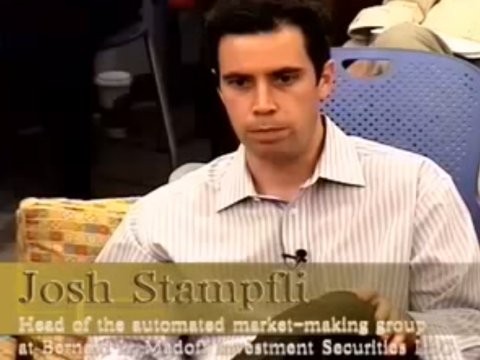HighFrequency Trading Is HighTech Cheating
Post on: 16 Май, 2015 No Comment

Recent Posts:
High-Frequency Trading Is High-Tech Cheating
According to a recent article in The Wall Street Journal . the Securities & Exchange Commission is looking to take on “high-frequency trading.” For those unfamiliar with the practice, it involves having stocks trade almost instantaneously when a certain algorithm or data point is identified by sophisticated computers. Some HFT positions are held for only a matter of seconds, and often theres no net investment at the end of a given trading day.
In short, it’s a kind of automatic trade that takes place without most folks even noticing faster than a human can place a stock order and faster than even the sharpest analyst can break down the charts.
It’s about time the SEC decided to take on high-frequency trading. There are enough people who already think Wall Street is a rigged game, and HFT tactics are at worst cheating and at best a performance-enhancing drug that hasn’t been fully examined by regulators.
Here are the knocks against high-frequency trading and why I think the practice is giving Wall Street a bad (well, worse) name among retail investors:
Competitive Inequality
Theres no guarantee that a Wharton MBA working at Goldman Sachs (NYSE:GS ) is any smarter than you or me. Frankly, theres a lot of evidence to the contrary. However, HFTs high-tech advantage is indisputable and something even the sharpest individual investor could never recreate on his or her own.
Clogged Trading Queues
A report by the Tabb Group estimates that as many as 98% of orders placed by these computers are canceled before they become trades. HFT algorithms propose theoretical market moves and prepare to pounce, but then have to back off when the metrics don’t play out as hoped.
Critics worry that the sheer volume of canceled trades are a drag on market liquidity and the ability to process legitimate investments by human beings. As a result, one of the end-arounds to limit high-frequency trading may include charging investment banks for their canceled trades a hefty price that would certainly curtail activity by eating into profits.
Computers Shouldn’t Be Allowed to Invest
We can quibble about the nature of “investments” by human swing traders who get into a stock at 10 a.m. and exit by 2 p.m. And I suppose you can say a computer is “selling” your stocks in your E*Trade account when you execute a stop-loss. But there is an actual person setting up and approving the transactions in those trades. A computer is simply the tool used to execute a decision made by a live investor.
Last time I checked, computers aren’t allowed to own anything yet, so allowing them to set investment strategy seems inappropriate and dangerous. But maybe that’s just part of my aversion to the futures presented by Blade Runner or Skynet in The Terminator .
Black Box Algorithms Can Crash the Market

SEC Chairman Mary Schapiro has said that a large portion of equities trading has little to do with the fundamentals of the company thats being traded. Some would argue that technical analysis often has little to do with fundamentals, either but what Schapiro is getting at is that these trades are based not on a rational investment thesis but rather just a bunch of “if/than” statements on a hard drive.
The results can be catastrophic such as the “flash crash” of May 2010.
HFT Has No Value to the Broader Market
There are a lot of folks who malign short sellers or options traders. But shorts and options are good ways for investors to hedge their bets in uncertain times. Puts and calls also add to market liquidity, helping Wall Street more accurately price equities.
But you have to wonder what high-frequency trading does for the broader marketplace. If generating profits for the biggest hedge funds and investment banks is the only “benefit” of this strategy, it’s a suspect reason for allowing the practice to continue.
Perhaps most damning reason is that I have yet to come across a single retail investor or money manager who thinks high-frequency trading is a good thing. A few are indifferent, but no one is a proponent.
What do you think? Am I just being paranoid? Post your comments below or drop me an email at editor@investorplace.com.














